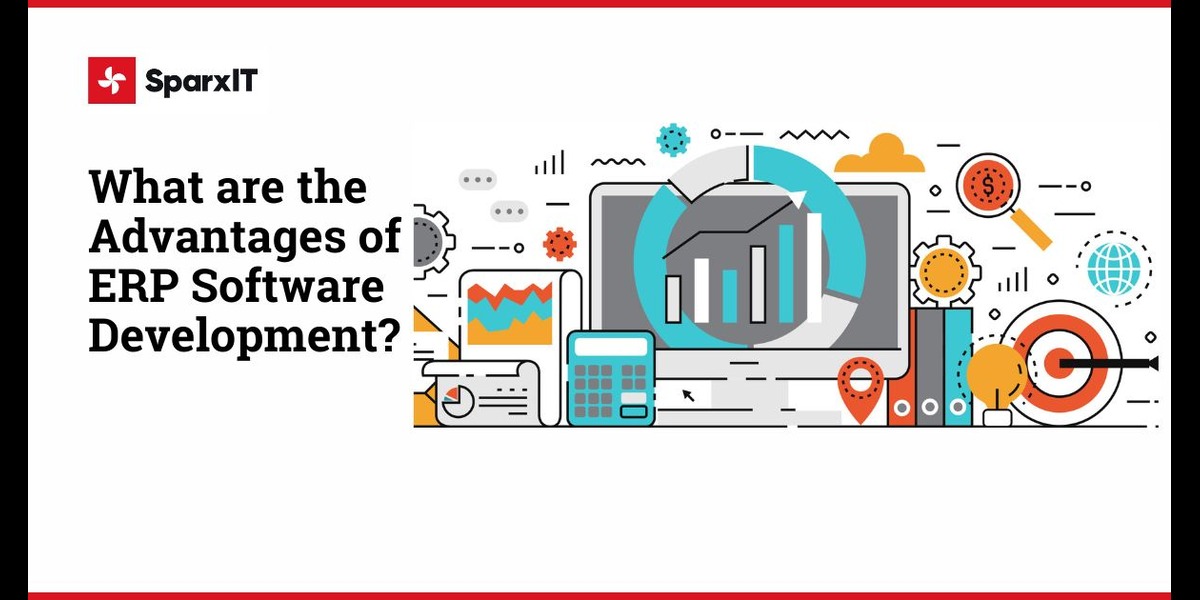What are the Advantages of ERP Software Development?

Experience, aptitude, and business savvy are all necessary for running a successful company, but the most essential qualities are prudent process management and leveraging the benefits of enterprise resource planning. In today's fiercely competitive business environment, entrepreneurs must seize every opportunity and adopt new technologies, such as ERP software, to maximize productivity and gain a crucial edge.
ERP software has long been shown to be the industry leader in corporate software solutions. This post will describe the advantages of ERP software development.
7 Advantages of ERP
An ERP system has several advantages while having a simple concept: it unifies all departments and their data on a single system. These are the top 7 noteworthy benefits that an ERP system provides:
Improved Performance
ERP software serves as a central hub, establishing linkages between all areas of corporate management, including supply chain management, human resources, production, sales, customer service, and inventory. ERP software uses computer technologies to enable quick and effective automated handling of corporate data. One of the most notable advantages of implementing business resource planning systems is the significant decrease in paperwork and the decreased need for human data entry. This reassures business owners about the efficiency of ERP software development, reducing the possibility of human mistakes interfering with industrial processes and eliminating the need to transform paper-based data into digital formats.
Improved Information Availability and Security
One of the main advantages of enterprise resource planning (ERP) affects all the other benefits that made it onto this list. Advanced ERP systems facilitate the effective and centralized collection, handling, and storage of manufacturing, sales, inventory, or client data. Maintaining multiple distinct databases is no longer necessary, which would have required frequent review and synchronization to eliminate duplicate or out-of-date records since everything is managed centrally.
Improved Coordination
The integrated system that combines consumer and business data facilitates cooperation between different departments or branches of the firm. ERP software development increases productivity and indirectly reduces operating costs by lowering communication delays across the organization. This benefit is especially beneficial for businesses with a scattered affiliate network spanning multiple states or continents. As a result, every person in the organization will feel more secure and eventually become more productive because their work will be backed by a dependable internal system that is fail-safe.
Precise Planning
Access to a multitude of company data is readily available, which significantly streamlines the process of analyzing it and lays the groundwork for developing a strategic plan for future expansion. The company's management teams and business analysts can more effectively utilize aggregated data to formulate new plans or suggest ways to improve current ones. Furthermore, using artificial intelligence and machine learning algorithms to evaluate data and swiftly turn it into insightful knowledge is another advantage of ERP software development services in this area. A bespoke ERP system makes risk management more accessible and gives the company more flexibility, which is critical for competitiveness in today's market.
Enhanced Reports
ERP software offers an easy-to-use platform for quickly and simply creating various reports, including inventory, customer behavior, technical maintenance, and more, because of reduced paperwork and improved interdepartmental communication. Since every report is digitally saved and transferred, access to the data is constant and instantaneous. Besides, implementing varying access levels for various user types is an excellent method to safeguard critical data. In many businesses, ensuring regulatory compliance also requires vigorous data protection systems.
Scalability and Flexibility
The modular design of ERP platforms determines another of the intrinsic advantages of ERP software development. It allows scaling modifications according to the demands and circumstances of the business today. This characteristic makes it possible for a resource planning system to quickly adapt to the growth or shrinkage of the industry at every stage. For even the most minor changes to the organizational structure and business operations, high flexibility in ERP solutions is required, such as adding new departments, staff, production facilities, suppliers, and goods. ERP software easily handles many changes, including increasing production, adding more inventory, adding new features and services, and welcoming more users. It also handles several other changes with smooth efficiency.
Cost Effectiveness
ERP systems contribute to the reduction of administrative costs by optimizing everyday routines, reducing paperwork, and, most importantly, reducing repeated jobs. Additionally, company activities like logistics, stock management, supply chain management, etc. that require numerous information requests and approvals are expedited and cost-effectively reduced by resource planning systems.
Wrapping Up
ERP systems are not all-purpose answers that ensure users will embrace them with 100% success, lower operating costs, and better efficiency. Instead, they have a variety of benefits and drawbacks that need to be considered when evaluating the need for and financial viability of using such systems. The advantages of different business resource planning systems, both custom-made and commercially available, are essentially the same.
In summary, ERP software development streamlines corporate operations by centralizing all data flows, facilitating easy scaling, improving customer interactions and demand forecasts, increasing productivity and happiness, and saving time and money.
Hyperlink InfoSystem - Most Trusted End-to-End development Solution Provider.
Write For Us





